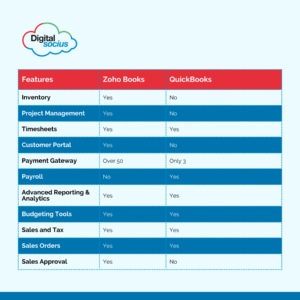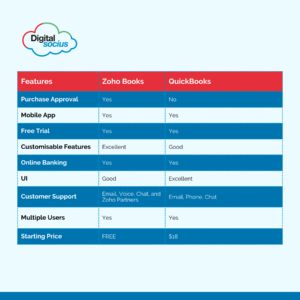Zoho Books and QuickBooks are two of the most used all-in-one accounting tools in the world. Therefore, when businesses want to purchase software for their accounting tasks and transaction management, they are usually faced with the challenge of choosing either Zoho Books or QuickBooks. In this article, we delve into the key differences between these two end-to-end digital solutions to help you make an informed decision. Join us.
Zoho Books or QuickBooks: An Overview
Below is a brief overview of Zoho Books and QuickBooks, including their ratings and estimated user base.
What is Zoho Books?
Zoho Books is a digital accounting software that helps businesses of all sizes keep accurate records of their finances. This cloud-based account management tool helps users track expenditures, calculate financial data, and generate reports from any device.
Zoho Books has features for receivables, payables, inventory, banking, time tracking, payroll management, transaction monitoring, contact management, and reporting. With Zoho Books, you can automate accounting workflows, including sending automatic payment reminders.
On this online accounting software, there’s a client portal that keeps previous transaction history intact for easy access and retrieval. Zoho Books has a rating of 4.4/5 on Capterra. Zoho’s software has over 100 million users worldwide.
What is QuickBooks?
QuickBooks is an accounting software for small businesses created by Intuit. It allows users to track expenses, customise invoices, and run reports. Companies can use QuickBooks to automate processes like organising and segmenting business transactions.
With this software, you can integrate multiple bank account numbers, and it will help you retrieve past transaction history. QuickBooks has a rating of 4.3/5 on Capterra. Like Zoho books, QuickBooks is also compatible with different devices. The company claims that over 7 million small businesses use their platform online.
Zoho Books vs QuickBooks: Key Differences
Here, we compare Zoho vs QuickBooks in terms of their key differences. To make this comparison, we’ve segmented these softwares into eight key features and functionalities, namely
1. User Experience
2. Invoicing Feature.
3. Payroll Feature.
4. Reporting Feature.
5. Apps Integrations.
6. Customer Support.
7. Device Compatibility.
8. Training.
1. Zoho Books vs QuickBooks: User Experience
Zoho Books and QuickBooks have great user interfaces that allow for easy navigation on the platform. Both accounting applications organise critical data like profit and loss, cash flow, expenses, and more into dashboards so that you can easily find what you need. However, Zoho has a more appealing interface that makes data easier to interpret, making it a better option in terms of user experience.
2. Zoho Books or QuickBooks: Invoicing Feature
Zoho Books offers 16 ready-to-use templates for creating neat invoices, and businesses can personalise them to match their brand. Automation in Zoho Books makes it easy to send recurring invoices, saving time. The platform also supports retainer invoices, and it enhances security by encrypting all PDF invoices.
Notably, with Zoho Books’ free plan, small businesses can send up to 1,000 invoices annually without charge, setting it apart from QuickBooks. QuickBooks also provides features for efficient invoicing. It allows organisations to generate professional-looking invoices and send them via various channels, like email and SMS.
QuickBooks offers six customisable invoice templates, similar to Zoho Books. An added advantage is the ability to include bank transfer and payment gateway links directly in the invoices, improving the client experience by enabling convenient payments without direct communication with the company.
3. Zoho Books vs QuickBooks: Payroll Feature
Zoho Books and QuickBooks Online don’t include payroll features in their basic plans, but they offer it as an additional option. Zoho Books supports integrations such as Zoho Payroll and SurePayroll, allowing businesses to handle employee management. Zoho Payroll provides a 14-day trial for users to explore its features and functions.
4. Zoho Books or QuickBooks: Reporting Feature
QuickBooks Online and Zoho Books offer a wide range of reports. Although both surpass many other accounting software options, QuickBooks Online boasts over 80 reports, surpassing Zoho Books’ 50+ reports.
5. Zoho Books vs QuickBooks: Apps Integrations
Zoho Books and QuickBooks Online both provide compatibility with widely used business tools like PayPal, Stripe, and Shopify. Zoho Books also provides a unique client portal, allowing clients to log in and handle their transactions, making it better at app and payment gateway integrations than QuickBooks.
Additionally, with Zoho Books, you can easily integrate other Zoho tools like Zoho CRM, Zoho Inventory, Zoho Projects and many more that your business will need as it grows.
6. Zoho Books or QuickBooks: Customer Support
Zoho Books and QuickBooks both deliver excellent customer support to their users. Both accounting applications offer assistance through various channels like voice calls, chat, and email. Additionally, they maintain FAQ pages, enabling customers to independently address their queries.
7. Zoho Books vs QuickBooks: Device Compatibility
Zoho Books and QuickBooks are both cloud-based tools and are compatible with different devices. They also come with applications for mobile devices that make it easy for users to manage their accounts from their smartphones.
Yet, the Zoho Books mobile app provides extra compatibility for Windows tablets and Kindle devices, in addition to Android and iOS, giving it a competitive advantage over the QuickBooks mobile app.
8. Zoho Books or QuickBooks: Training
Ensuring customers receive proper training post-purchase is crucial for companies. Zoho Books and Quickbooks offer diverse training options to enhance user understanding of their platforms.
Video tutorials, webinars, live online sessions, and written materials are available from both applications to facilitate learning. Notably, Zoho Books goes a step further by providing in-person training, a service not offered by Quickbooks.
Zoho Books and QuickBooks Online: Pricing
Zoho Books Pricing Breakdown
Zoho Books provides a range of six pricing plans, structured on a per-organisation basis rather than per user. The price changes with your location. The foundational plans are as follows:
- Free: £0 for businesses earning less than 35K USD annually.
- Standard: £10 per organisation per month (annually) or $12 per organisation per month (monthly).
- Professional: £24 per organisation per month (annually) or £20 per organisation per month (monthly).
- Premium: £25 per organisation per month (annually) or $70 per organisation per month (monthly) – with a 14-day free trial available.
- Elite: £85 per organisation per month (annually) or £30 per organisation per month (monthly).
- Ultimate: £165 per organisation per month (annually) or £199 per organisation per month (monthly).
Zoho Books also presents the following optional add-ons:
- Additional Users: £2.5 per user, per month.
- Advanced Auto Scans: £8 per month for 50 scans monthly.
- Branches: £10 per branch, per month.
QuickBooks Online Pricing Breakdown
QuickBooks Online provides a selection of four pricing tiers:
- QuickBooks Self-Employed: Priced at £5 per month, for first 6 months, then £14 per month afterwards.
- QuickBooks Simple Start: Priced at £7 per month, for first 6 months, then £14 per month afterwards.
- QuickBooks Essentials: Priced at £14 per month, for first 6 months, then £28 per month afterwards.
- QuickBooks Plus: Priced at £19 per month, for first 6 months, then £38 per month afterwards.
- QuickBooks Advanced: Priced at £45 per month, for first 6 months, then £90 per month afterwards.
- New QuickBooks users have the option to either opt for a 30-day free trial to explore the platform or choose a 50% discount for the first three months, but not both.
Comparing Zoho Books and QuickBooks
Zoho Books or QuickBooks? Check out how both end-to-end business accounting tools compare.


Want to experience Zoho Books? Try Zoho Books for FREE now
Advantages and Disadvantages of Zoho Books
Pros:
- Small businesses can benefit from a perpetually free plan.
- No-obligation 14-day free trial for users to explore the platform.
- Transparent pricing options catering to different needs.
- More cost-effective compared to QuickBooks Online.
Cons:
- Requires external integration for automatic sales tax calculations.
- Full functionality in invoicing and inventory requires the setup of free add-ons.
- Limited to five complimentary receipt scans before add-on charges apply.
Advantages and Disadvantages of QuickBooks Online
Pros:
- Widely utilised by the majority of accountants and bookkeepers.
- Free receipt capture is provided with all plans.
- Automatic sales tax calculations within the tool.
Cons:
- Choice between a free trial or 50% off the initial three months.
- Comparatively higher cost compared to Zoho Books.
- User limit capped at 25 even on the most expensive plan.
- Room for improvement in customer support.
Is Zoho Books or QuickBooks Online the better choice for your organisation?
Choosing between Zoho Books and QuickBooks Online depends on various factors tailored to your organisation’s specific needs. Consider factors such as features, scalability, pricing, and integration capabilities to determine which platform aligns best with your business requirements.
Nevertheless, it is worth pointing out that Zoho Books is more affordable and offers you additional tools from the Zoho ecosystem that your business can benefit from. On the other hand, QuickBooks is a more advanced option, but it may be difficult for inexperienced users to set up. Although you’ll need some level of ongoing support to implement both tools, setting up Zoho Books is much easier, but it’s recommended that you work with a Zoho Partner to make the entire process seamless for you.
Need help Implementing Zoho Books for your business? Contact a Leading Zoho Advanced Partner Now.



0 Comments